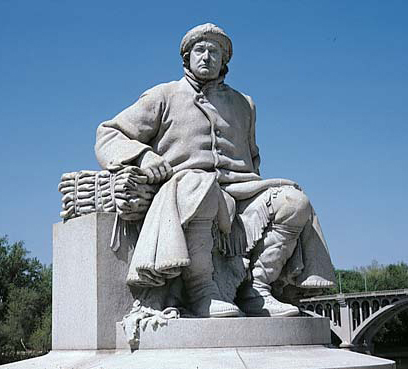This year on July 4th, Independence Day, the Italian Tribune honors Italian Americans who made great contributions during the Revolutionary War era and the infancy of America. Each campaigned for freedom, lived a life of patriotism and inspired the Founding Fathers. The America we know and love today would not be the nation it is today without the important contributions of these outstanding Italians.
William Paca
William Paca was of Italian ancestry and his name was originally spelled Pacci. Born outside of Abington, Maryland in 1740, Paca was a child prodigy. After being tutored in the classics by his parents, he was admitted to the College of Philadelphia at the age of 15 and earned his Master’s Degree at 19. He served as a Maryland Delegate to the Continental Congress from 1774 to 1779 and was also a Maryland State Senator from 1777 to 1779. Following his run as Senator, Paca served as “President” (Governor) of Maryland from 1782 to 1785. In 1789, President George Washington appointed Paca a Federal District judge, a position he held until his death in 1799.
In pre-Revolutionary War years, Paca was a strong opponent of British oppression. As a Delegate of the Continental Congress, he was instrumental in convincing conservative politicians in Maryland to support the Declaration of Independence. In 1776, he signed the document to the immediate right of John Hancock’s signature. Two years later he helped to create and voted to adopt the Constitution of the United States.
One of the most influential lawyers and politicians of his time, William Paca was a true patriot whose ideas and actions contributed to the freedom that our country now enjoys. With Paca’s help, the United States became free from British rule and the contemporary Italian community can take pride in knowing that our people are represented by his name on the document that promises our freedom. Today, history buffs can visit the William Paca House and Garden in Annapolis, Maryland, one of the city’s most elegant landmarks.
Caesar Rodney
Caesar Rodney was born in 1728 on his family’s farm near Dover, Delaware. He was the son of Caesar and Mary Crawford Rodney and the grandson of William Rodney, who came to America in the 1680s and was a descendent of the prominent Adelmare family of Treviso, Italy.
In 1755, Rodney was elected Sheriff of Kent County, Delaware and subsequently served in a series of county positions. During the French and Indian War, he was commissioned a captain of the Dover Hundred Company in the Delaware militia. From 1769 to 1777, he was an Associate Justice of the Supreme Court of the Lower Counties of Delaware.
Rodney joined the American Revolution in 1765 as a delegate to the Stamp Act Congress. On June 15, 1775, he helped to lead Delaware’s Assembly of the Lower Counties in a vote to separate all ties between the then-colony and the British government. A year later, Delaware was set to vote with the rest of the colonies on a resolution that would officially sever the colonies’ ties with Great Britain. On July 1, Rodney received word that Delaware’s two delegates were deadlocked on the vote for America’s independence. Rodney traveled 80 miles on horseback during a thunderstorm to arrive in Philadelphia on July 2, enabling his home colony to vote in favor of Thomas Jefferson’s resolution and signing the original Declaration of Independence.
In 1778, Rodney was elected Governor of Delaware, but his body was wracked by asthma and skin cancer, causing him to resign three years later. Rodney’s illnesses also prevented him from serving a full term as a Delaware Assemblyman when elected in 1783, although the Legislature respectfully held sessions in his home until his passing in 1784. The Delaware state quarter, issued in 1999, features an image of Rodney’s famous ride to Philadelphia to cast the state’s deciding vote for the Declaration of Independence.
Francis Vigo
The five mid-western states of Indiana, Illinois, Ohio, Michigan and Wisconsin might not be part of the United States today if it had not been for an Italian-born patriot named Colonel Francis Vigo. Born in Mondovi in the Kingdom of Sardinia in 1747, he came to America as a soldier and found his fortune as a fur trader. Though involved with pre-Revolutionary activities for many years, Vigo performed his greatest act of patriotism during the Revolutionary War in 1778, when he aided Colonel George Rogers Clark in taking the mid-west territory from the British.
Upon his arrival in Vincennes, Indiana, Vigo was captured by American Indians and turned over to British faction led by Governor Henry Hamilton. He was able to convince the British troops that he was just a fur trader from St. Louis, though it is said that Vigo held a note intended for Colonel Clark that he chewed and swallowed in order not to give up American military secrets.
While a prisoner of the British, Vigo studied the strength of Indiana’s Fort Sackville. After being released, the patriot paddled 500 miles through the Ohio and Mississippi Rivers to get to Colonel Clark and share the information he gathered. Vigo recommended an attack on British at Vincennes. Colonel Clark took Vigo’s advice and his American forces, along with help from French forces recruited by Vigo, surprised the British troops and forced them out of Vincennes without losing a single man. Based on this victory, the fledgling United States gained the territory that would later become five mid-western states.
Philip Mazzei
A famous thinker that contributed ideas to Thomas Jefferson’s Declaration of Independence, Filippo (Philip) Mazzei was a true Renaissance man. He worked as surgeon in Florence, Constantinople and Smyrna; as a merchant and language teacher in London; as a writer and diplomat in Paris and as a royal chamberlain and privy councilor in Warsaw. Perhaps most importantly, Mazzei was an advocate of democracy. A close friend and mentor of Thomas Jefferson, Mazzei was an outstanding figure of the Enlightenment, to whom America owes thanks for our ideals of liberty and independence. Filippo Mazzei outlined the doctrines of democracy and provided the framework for the policies which Jefferson would promote.
Born in Poggio a Caiano, near Florence, Italy, on Christmas Day in 1730, Mazzei grew up to become a self-made man. He lived in London for 17 years before immigrating to Virginia in 1773. He settled near Monticello, the home of Thomas Jefferson, where he introduced the cultivation of vineyards and olive groves. He soon joined forces with Virginia’s leaders in their struggle for independence, writing in Italian and American gazettes and proposing political designs for his new home state. In addition, his ideas and theory of government were incorporated into the major political writings of the period. But Mazzei didn’t just write – he put his ideas into practice by organizing the Constitutional Society which included as members, Thomas Jefferson and representatives from other states. The shared ideas became a precursor to the United States Constitution. Jefferson used the words and beliefs of Mazzei to outline the ideals of the new freedom in the colonies – in fact, it is said that Jefferson’s words, “All men are created equal,” were first written by Mazzei. Jefferson was the perfect sounding board for Mazzei’s ideas. The dynamic man, who left such a great imprint on the ideals of America, retired to Pisa, Italy and died there in 1816. The memory of his accomplishments and contributions live on to this day as we move through our daily lives in the free nation of liberty that is our home.





